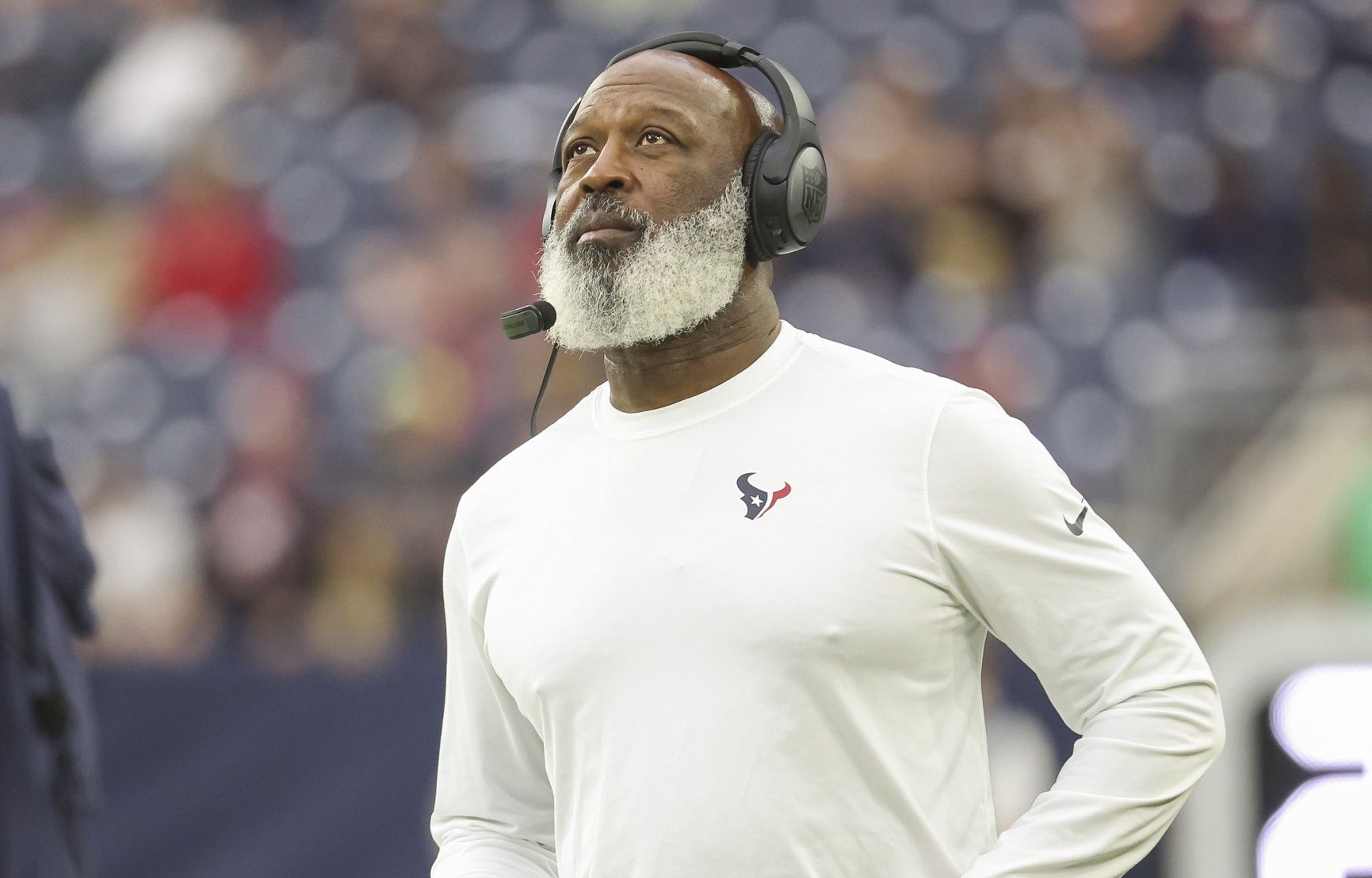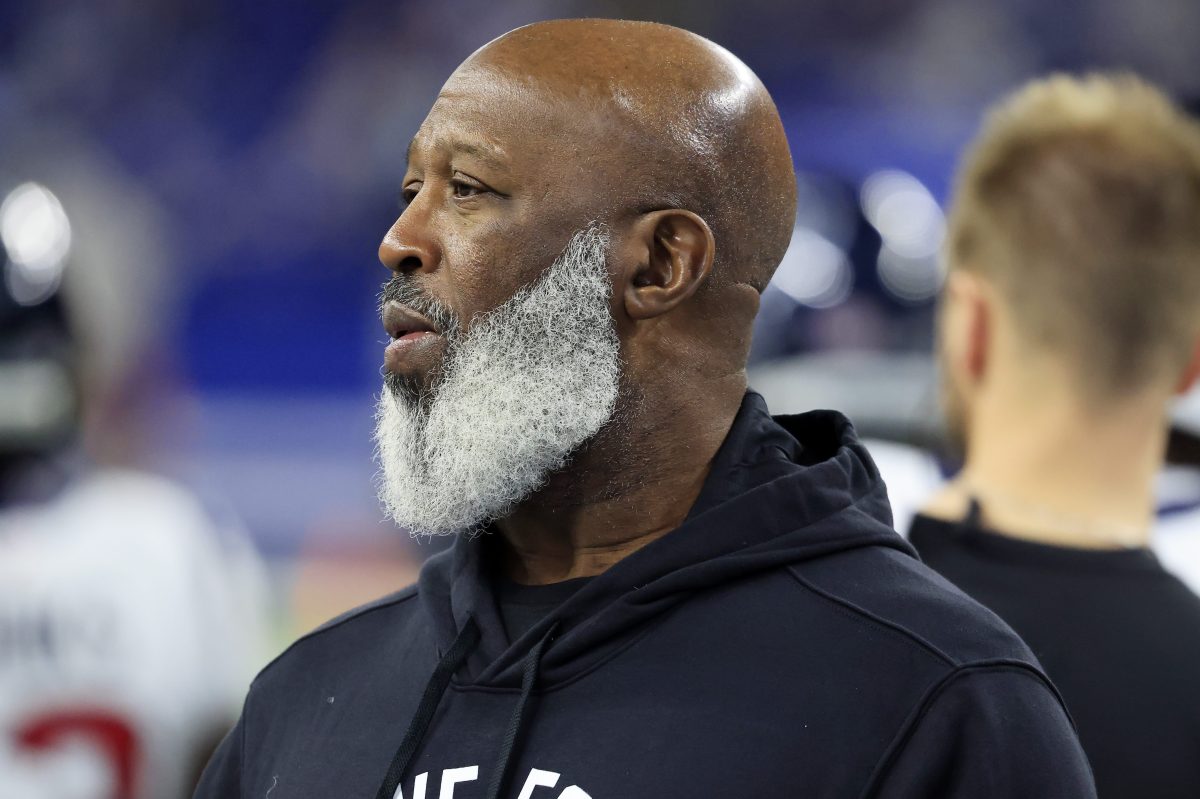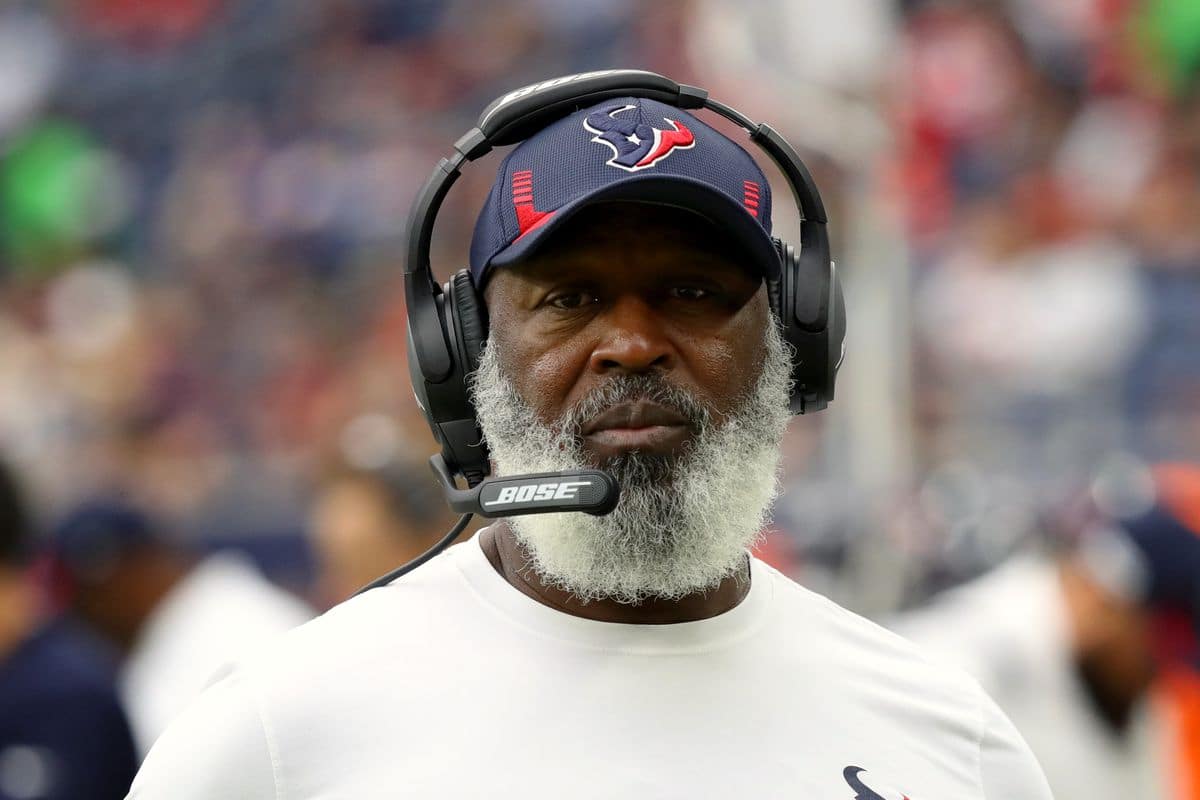Lovie Smith - Coaching Tenure And Contract Details
There's a lot of talk, so, about what goes on behind the scenes in the world of professional coaching, especially when someone like Lovie Smith is involved. You know, it's almost like a puzzle, with different pieces coming together to form a picture of how a team is put together and how it might perform. The conversations around his time as a coach, and what that might mean for the future, tend to be quite interesting, touching on everything from how players get ready for big games to the financial arrangements that shape a coach's path.
When you think about the feeling surrounding a team, there are times when things feel very promising, even when the immediate results might not show the whole story. People, you see, often look for signs of progress, for moments where a team shows it can really step up and compete. It's about more than just the final score; it's about the effort, the preparation, and the potential that seems to bubble just beneath the surface, giving everyone a reason to keep watching and keep hoping for what might come next.
And then there are the practical considerations, the parts of the business that shape a coach's ability to do their job. These details, like contract agreements and past arrangements, are a pretty significant part of the overall picture. They can influence how a coach is perceived, how much flexibility they have, and even what happens if things don't quite go as planned. It's a complex interplay of on-field performance and off-field deals, all contributing to the story of a coach's time with a team.
- Otis Williams
- Fortune Feimster
- Valerie Bertinelli
- Daunte Culpepper
- Kevin Spacey Says He Has No More Money Actually Its Even Worse Than That
Table of Contents
- Who is Lovie Smith? A Look at His Coaching Path
- What Made the Lovie Smith Hire So Notable?
- How Did the Team Perform Under Lovie Smith's Guidance?
- Is Lovie Smith's Situation a Win-Win for Everyone Involved?
- What Were the Key Aspects of Lovie Smith's Contract?
- Why Was There Concern About Setting Expectations for Lovie Smith?
- How Does Lovie Smith Compare to Other Coaches Mentioned?
- What's Next for Lovie Smith?
Who is Lovie Smith? A Look at His Coaching Path
When we talk about Lovie Smith, the information available to us focuses primarily on aspects of his professional coaching career and the financial arrangements surrounding his time with certain teams. It seems, you know, that the provided details highlight moments of his coaching tenure and specific contract points rather than a broader life story. So, while we can discuss elements of his professional standing, general personal background information is not part of the source material we are working with here.
Personal Details and Bio Data of Lovie Smith
| Category | Information Provided |
|---|---|
| Personal Name | Lovie Smith |
| Date of Birth | Information not provided in source text. |
| Place of Birth | Information not provided in source text. |
| Educational Background | Information not provided in source text. |
| Key Coaching Roles Mentioned | Tampa Bay (former), Team against Northwestern (implied), Texas (future expectation) |
| Contract Revision Date Mentioned | September 7, 2016 |
| Financial Details Mentioned | $1. (implied million), Less than Jason Heyward, No opt-out clause, Tampa Bay paying part of salary after firing. |
What Made the Lovie Smith Hire So Notable?
The decision to bring Lovie Smith on board as a coach was, in some respects, seen as a truly remarkable move. There was, apparently, a widespread feeling that this was a hire that stood out from the crowd. People were talking about it, and it seemed to get a lot of attention across the country. The sentiment was that this was a completely outstanding choice, one that brought a good deal of positive recognition. It was, you know, a moment that generated a lot of buzz and seemed to signal something significant for the team involved.
Part of what made this particular coaching appointment so noteworthy was the kind of experience Lovie Smith brought with him. It was pointed out, for example, that many of the individuals associated with this hire, with one exception, had backgrounds in the National Football League. This connection to the highest level of professional play often carries a certain weight. It suggests a level of experience and a particular way of doing things that can be quite appealing to those looking for a coach to lead a team. So, this aspect, the NFL connection, was seen as a real positive, contributing to the overall sense that this was a very strong pick.
When a team makes a coaching choice that garners so much national attention and is described as "outstanding," it naturally sets a certain tone. It creates a sense of expectation, a feeling that something important is happening. This kind of hire can, perhaps, give the fan base and the players a boost of confidence, making them feel like the organization is making serious efforts to improve. It's almost like a statement, you see, a declaration of intent about the kind of future the team hopes to build. The focus on Lovie Smith's background and the praise for his selection really highlight the significance of this moment for the team.
How Did the Team Perform Under Lovie Smith's Guidance?
It's interesting to consider how a team can, just a little, really pull itself together and get ready for a big game in a short span of time. We are talking about a situation where, in just one week, a group of players could be brought to a point where they were prepared to play a game like the one against Northwestern on a Saturday. This suggests a capacity for focus and preparation that is quite impressive. The ability of a coach to get players ready, both mentally and physically, in such a quick turnaround is a valuable skill, and it speaks to the work put in during that short period.
However, even when a team shows a lot of readiness, the outcome of a game can still hinge on a few key moments. There's a mention, for instance, of a few dropped passes in that game against Northwestern. It's almost like those small occurrences can change the whole story. You know, if those plays had been completed, there's really no telling what might have happened. The result could have been very different. This idea that a game's path can be altered by just a handful of plays means that even when a team is well-prepared, there's always an element of unpredictability, a kind of "what if" that stays with you after the final whistle.
So, while the preparation was clearly there, and the team showed it could get itself in a good position to compete, the actual outcome was, in a way, shaped by those specific moments. It highlights how coaching can bring a team to the cusp of success, getting them ready to perform at a high level. Yet, the game itself involves individual actions that can, at times, influence the final result in ways that are hard to predict. The effort to get the team prepared was evident, and that, you see, is a significant part of the coaching impact, even when the scoreboard doesn't fully capture the entire narrative.
Is Lovie Smith's Situation a Win-Win for Everyone Involved?
There's a perspective that Lovie Smith's situation, whatever the outcome, presents a positive scenario for the organization. It's described, quite simply, as a "win-win" situation, which suggests that no matter what happens, the team comes out ahead in some way. This kind of outlook implies a strategic view of the coaching role, where the organization benefits regardless of whether the coach achieves immediate, clear success or if things take a different turn. It's a way of looking at the long game, you know, and how different paths can still lead to a favorable position.
One part of this "win-win" idea is what happens if Lovie Smith does well in the coming year. If he succeeds, then there will be, so, a lot of positive reactions all around. We are talking about high fives and general happiness, which would mean that the team's performance meets or even goes beyond expectations. This outcome would certainly be a cause for celebration, validating the decision to bring him in and showing that the team is moving in a good direction. Success for the coach means success for the team, and that, naturally, is a very good thing for everyone connected with the organization.
On the other hand, the "win-win" perspective also considers what happens if Lovie Smith does not succeed in the next year. If that were to happen, then the argument is that the coach who comes in next would, apparently, walk into a pretty good situation. This suggests that even if Lovie Smith's tenure doesn't lead to the desired results, his time might still set up the team for future improvement. Perhaps he helps build a foundation, or brings in certain players, or creates a specific culture that makes the job more appealing and manageable for the next person in charge. So, even in a scenario that might seem less than ideal, there's a perceived benefit for the team moving forward.
The concept of a "win-win" here seems to indicate a thoughtful approach to team management and coaching changes. It means that the organization has considered different possibilities and believes it is positioned to benefit regardless of the immediate results. This kind of thinking can, in a way, reduce some of the pressure that often comes with coaching roles, as there's a built-in understanding that various outcomes can still contribute to the team's overall progress. It's a pragmatic view, you see, aiming for a favorable result no matter which way the cards fall.
What Were the Key Aspects of Lovie Smith's Contract?
The details of Lovie Smith's contract were, quite importantly, revised at a specific point in time, on September 7, 2016. This revision indicates that there were some changes made to his agreement, which is a fairly common occurrence in the world of professional sports. The fact that it was revised suggests that circumstances or expectations might have shifted, leading to a new set of terms for his employment. So, this date marks a particular moment in the financial arrangement between Lovie Smith and the organization.
Regarding the financial terms, the interim chancellor, Barbara Wilson, mentioned a figure of $1. This, in context, very likely refers to a sum in the millions, a significant amount for a coaching contract. What's interesting is that this amount was, apparently, less than what a player like Jason Heyward was receiving. Comparing a coach's salary to that of a high-profile player, particularly one known for a substantial contract, provides a benchmark. It suggests that while Lovie Smith's compensation was considerable, it was perhaps considered a reasonable or even a good value in comparison to other notable figures in professional sports at the time. This comparison, you know, gives a sense of the financial landscape.
Another notable aspect of this revised contract was the absence of an opt-out clause. This means that Lovie Smith did not have the option to leave the contract early under certain conditions. The lack of an opt-out clause typically implies a stronger commitment from both sides, at least on paper. It suggests a certain level of stability and a clear understanding that the agreement was set for its full term without an easy way for either party to back out. This can be seen, perhaps, as a sign of confidence in the long-term plan, or simply a reflection of the terms that were agreed upon during the revision.
Furthermore, there's an interesting detail about Tampa Bay still contributing to Lovie Smith's salary. This suggests that even after he was no longer coaching for them, his previous team, the Buccaneers, were still paying him a portion of his earnings. This kind of arrangement is, in some respects, not entirely unheard of in sports, often stemming from previous severance agreements or specific clauses in contracts when a coach is dismissed. It means that his current compensation was, in a way, being supplemented by a past employer, adding another layer to his financial picture. This arrangement, you see, highlights the complex nature of high-level coaching contracts and the various factors that can influence a coach's earnings over time.
Why Was There Concern About Setting Expectations for Lovie Smith?
There was, it seems, a feeling of concern about the way Lovie Smith's arrival and the expectations around him were being discussed. The worry was that the talk, described as a type of "hyperbole," might be setting the organization up for a difficult situation later on. Hyperbole, in this context, refers to language that might be overly enthusiastic or exaggerated, creating expectations that are perhaps too high or not entirely realistic. This kind of talk can, you know, create a sense of pressure that is hard to manage, potentially leading to disappointment if things don't go perfectly.
The concern was that if the praise and anticipation were too strong, it could lead to a "fall" later. This means that if the team's performance didn't match the elevated expectations, the letdown could be more significant. It's a cautious viewpoint, suggesting that while optimism is good, it needs to be tempered with a realistic understanding of the challenges ahead. This kind of sentiment often comes from people who have seen similar situations play out before, where initial excitement gives way to frustration when results don't immediately materialize. So, the idea was to manage the narrative carefully, avoiding an overly optimistic tone that might backfire.
It was also pointed out that many of the individuals being mentioned in discussions about Lovie Smith, with the exception of one, were people with experience in the NFL. This fact, while validating the quality of the hire, might also contribute to the high expectations. If the coach and those around him have such a strong background, the thinking goes, then the results should be immediate and outstanding. This connection to a high level of professional play can, in a way, raise the bar even higher. So, while the hire was seen as excellent, the very reasons for its excellence also seemed to fuel the concern about setting expectations too high, potentially making the path ahead more challenging if immediate success wasn't achieved.
How Does Lovie Smith Compare to Other Coaches Mentioned?
In discussions about coaching performance and opportunities, there's often a comparison to others who have held similar positions. The text mentions a group of coaches who, in a way, "just missed the cut" in some context, providing a backdrop against which Lovie Smith's situation can be viewed. This list includes names like Danny Hope, Bill Lynch, John L. Smith, Scott Frost, and Tim Brewster. Each of these coaches had a certain number of games coached and a corresponding winning percentage, which gives a numerical measure of their past performance. These figures, you see, offer a snapshot of their records and how their teams fared during their tenures.
For example, Danny Hope coached 49 games with a winning percentage of .449. Bill Lynch also coached 49 games, with a slightly lower percentage of .388. John L. Smith had 48 games under his belt, achieving a .458 winning rate. Scott Frost, with 47 games, had a .340 percentage, and Tim Brewster's

NFL Coaches Fired Today: Houston Texans Fire Lovie Smith, Kliff

Texans Fire Coach Lovie Smith After Win Costs Houston Draft Pick

Former Chicago Bears Head Coach Lovie Smith Frontrunner For Houston